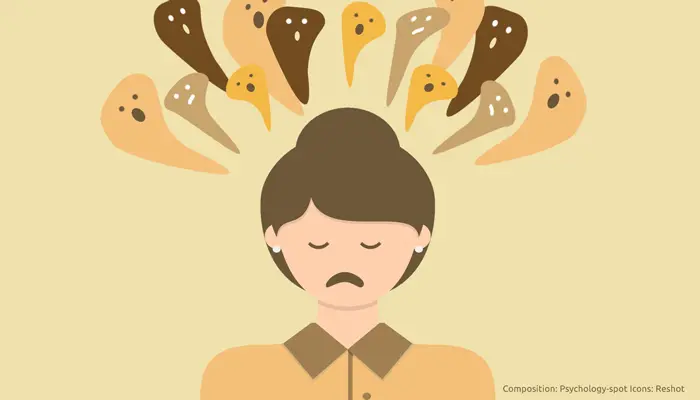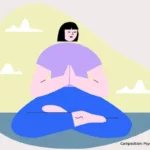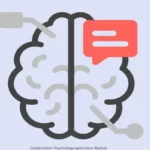
Nobody wants to feel anxious. The tension, anguish, and stress that accompany anxiety are not good travel companions. Therefore, it is understandable that we try to treat anxiety with all the means at our disposal. However, sometimes treatments and strategies to promote relaxation have counterproductive results in some people and end up triggering a paradoxical anxiety.
What is paradoxical anxiety?
Paradoxical anxiety is a reaction contrary to the expected effect of a treatment specifically designed to reduce anxiety. Therefore, it implies the worsening of anxiety after the administration of an anxiolytic or the performance of a relaxation technique with symptoms that can range from emotional lability and agitation to mental confusion, tachycardia and tachypnea.
There are some medications, such as citalopram that is used to treat depressive episodes in the initial phase and panic disorders, which increase the symptoms of anxiety at the beginning of the treatment. It is a paradoxical reaction that usually disappears after two weeks of continuous treatment, which is why it is advisable to start with low doses to reduce the possibility of the anxiety effect.
However, paradoxical anxiety is not just a reaction to anxiolytics. A study carried out at Alliant International University, for example, found that 30.8% of the group of people who had anxiety and had undergone a progressive relaxation session and 53.8% of those who did mantra meditation, reported a increased tension due to relaxation session.
Another study developed at the University of Virginia revealed that intentional relaxation in situations of great mental load, stress and anxiety can produce an increase in the conductance of the skin. The conductance of the skin is a fairly reliable measure of the level of stress and anxiety since when we are tense and distressed, there is a constriction of the cutaneous blood vessels that temporarily modifies the physical structure of the skin and the excitation of the Central Nervous System also triggers the secretion of sweat, which varies the conductance. In fact, the most tense people who tried to relax showed a higher conductance index than those who were stressed, but did not try to treat their anxiety.
What causes Paradoxical Anxiety?
The pathophysiological process behind paradoxical anxiety is unclear. It has been hypothesized that some anxiety medications, such as benzodiazepines, may contribute to loss of cortical containment in some people, facilitating an arousal state. In other words, they can cause the cortical areas to lose control, which would give way to anxiety. It is also known that there is a certain genetic susceptibility to this type of drug, which can increase the chances that these people will experience a paradoxical reaction.
In the case of relaxation techniques, such as diaphragmatic breathing, mindfulness or muscular relaxation, the paradoxical anxiety is due to a psychological response. In fact, it is called “relaxation induced anxiety.”
A study conducted at Pennsylvania State University found that, for some people, relaxation conflicts with the strategy they use to lessen the impact of negative events: ongoing worry. In practice, they found that people with generalized anxiety disorder were more sensitive to extreme emotional changes and tended to feel more anxious while practicing relaxation techniques.
In 2011, psychologist Michelle G. Newman developed the theory of “contrast avoidance” according to which, people can purposely become anxious as a coping strategy to avoid the emotional contrast that an adverse event could produce.
In practice, people with a tendency to anxiety use worry to avoid the experience of negative emotional contrast. These people develop a strong aversion reaction and extreme sensitivity to negative emotional contrasts, so that in order not to be vulnerable to these contrasting experiences, they prefer to remain worried, stressed or anxious than to be relaxed and calm. That way, if something negative happens, the emotional impact will be less and if something positive happens they can rejoice.
Basically, these people would “pay in advance” worrying about what might happen. They are always thinking of the worst so that adversity does not take them by surprise. They are always on the defensive, in an attitude of survival.
On the other hand, if they are completely relaxed they feel more vulnerable and less in control. That is why they cling to their worries, so that relaxation techniques are seen as a threat to the defensive balance. This is why they end up experiencing relaxation-induced anxiety.
How to deal with relaxation-induced anxiety?
If you experience paradoxical anxiety, the bottom line is not that you shouldn’t try to relax. In fact, the people who find it most difficult to relax and those most vulnerable to anxiety are precisely those who most need to disconnect and find peace of mind.
We all know people who find it difficult to lie on the beach, sit down to read, or just sit around and relax. However, contrast avoidance is not an adaptive coping strategy, it condemns you to permanently live in discomfort and anxiety.
People who don’t know how to be quiet could actually benefit from downtime or the dolce far niente. You may feel anxious at the prospect of relaxation, but the truth is that it is healthy to allow yourself to let your guard down and relax. They may experience paradoxical anxiety at first, but if they move on they will find that they can relax and even enjoy the experience. In this way they will realize that there is another way to live.
People with an aversion to relaxation should follow exposure therapy, which means gradually exposing themselves to situations that make them feel calm, so that the transition is easier and they can understand that they do not need to live all the time being defensive, with an emotional armor to protect them against potential threats.
Sources:
Kim, H. & Newman, M. G. (2019) The paradox of relaxation training: Relaxation induced anxiety and mediation effects of negative contrast sensitivity in generalized anxiety disorder and major depressive disorder. Journal of Affective Disorders; 259: 271-278.
Newman, M.G. & Llera, S.J. (2011) A novel theory of experiential avoidance in generalized anxiety disorder: A review and synthesis of research supporting a contrast avoidance model of worry. Clinical Psychology Review; 31: 371-382.
Wegner, D. M. et. Al. (1997) Ironic effects of trying to relax under stress. Behaviour Research and Therapy; 35(1): 11-21.
Heide, F. J., & Borkovec, T. D. (1983) Relaxation-induced anxiety: Paradoxical anxiety enhancement due to relaxation training. Journal of Consulting and Clinical Psychology; 51(2): 171–182.



